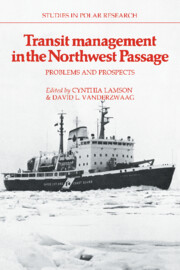8 - The designing of a transit management system
Published online by Cambridge University Press: 26 March 2010
Summary
The Concept
Function
The Canadian Northern Waters Project of Dalhousie Ocean Studies Programme is based on a fundamental assumption: that all major industrial and governmental activities involving the use or transit of Canada's Arctic waters should be brought under a single, comprehensive system of regulation and management. The envisaged system would not only constitute an entire transportation system, but would also be designed to affect the regulation and management of related matters, such as Arctic science, resource development, environmental protection, community concerns, industrial strategy, and international affairs. Since the primary purpose of such a system would be to maintain safe, efficient, and harmless passage of cargoes or products through, over or under these waters, it is referred to as a “transit-management system”. The object of this preliminary collection of essays has been to review some of the problems associated with designing a Northern waters transit-management system and to consider some of the basic or strategic options for decision-makers in the 1980s.
The concept of a Northern waters transit-management system arises, of course, from the growing temptation to open up the Northwest Passage for the surface and-or subsurface transportation of a variety of cargoes. For over a decade, shipments of ores have been transported by surface craft out of the Eastern Arctic to overseas markets, and it seems certain that the extraction and transportation of hard minerals from the Arctic region will continue on a larger scale in the years ahead.
- Type
- Chapter
- Information
- Transit Management in the Northwest PassageProblems and Prospects, pp. 279 - 308Publisher: Cambridge University PressPrint publication year: 1988



